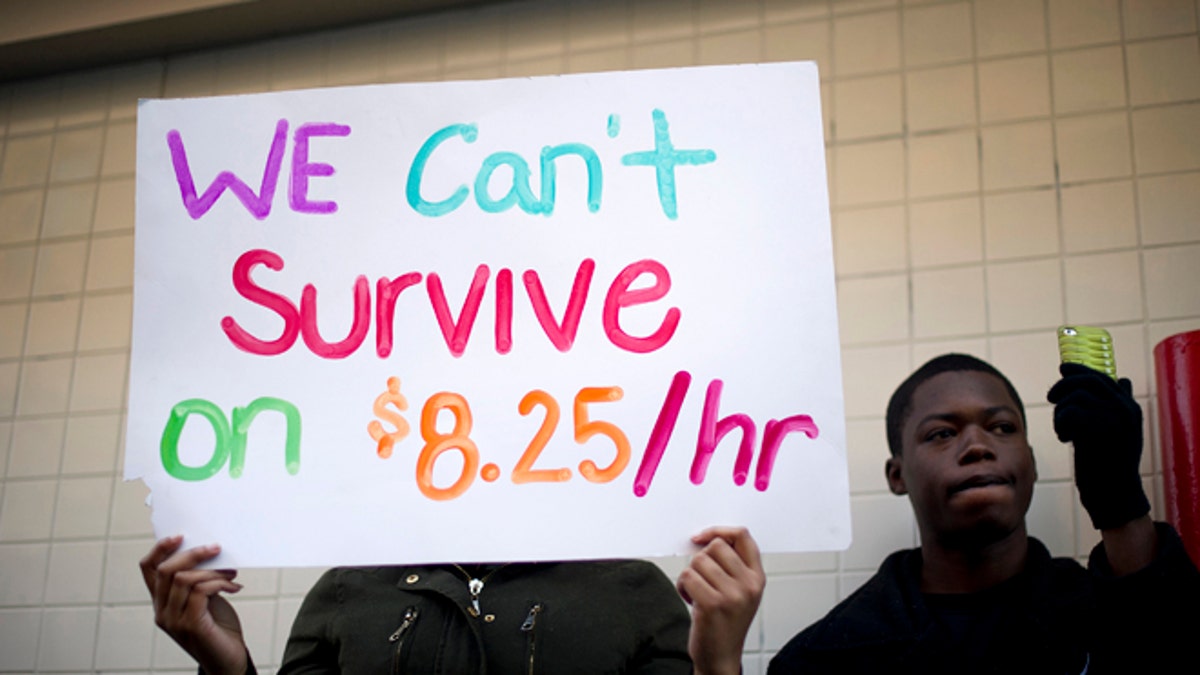
Dec. 5, 2013: Protesters calling for higher wages for fast-food workers outside a McDonald's in Oakland, Calif. (REUTERS)
President Obama on Saturday resumed his push to make millions more U.S. workers eligible for overtime pay, amid continued criticism that his efforts to close the country’s so-called “income gap” will hurt U.S. businesses.
“Our businesses have created 8.7 million new jobs over the past four years,” Obama said in his weekly radio and Internet address. “But in many ways, the trends that have battered the middle class for decades have grown even starker.”
The president earlier this week began touting a plan to update rules on which workers are eligible for time-and-a-half pay for their extra work. And he intends to sign a presidential memorandum Thursday directing the Labor Department to propose rules that expand the number of employees who can get overtime pay.
He argues that some salaried workers are now paid less than the minimum wage.
“That’s not fair,” he said Saturday.
Obama’s effort is just part of his so-called “Year of Action” and his larger, second-term agenda to close the income gap.
“I’m doing everything I can, with or without Congress, to expand opportunity for more Americans,” the president said Saturday, as he has said since his State of the Union address last month.
Obama has already used an executive order to increase the minimum wage for federal contract employees, and he has tasked the Democrat-controlled Senate to pass legislation that would increase the minimum wage for all Americans, from $7.25 to $10.10 an hour.
The president’s efforts also serve his and fellow Democrats’ political ends during this midterm election year, giving them a populist message that also includes a call for better pay among women.
However, the proposed changes to overtime and minimum wage have drawn criticism for Republicans and Big Business.
"The president's policies are making it difficult for employers to expand employment," House Speaker John Boehner said recently. "And until the president's policies get out of the way, employers are going to continue to sit on their hands."
"Similar to minimum wage, these changes in overtime rules will fall most harshly on small- and medium-sized businesses, who are already trying to figure out the impact of ObamaCare on them," said Marc Freedman, executive director of Labor Law Policy for the U.S. Chamber of Commerce.
The overtime rules would be aimed at salaried workers who make more than $455 a week and those who are ineligible for overtime because they are designated as management even though their supervisory duties are minimal.
The rules do not require congressional action but could take more than a year to implement.
In Obama’s memorandum to the Labor Department, he recommends new regulations that could increase the salary threshold for overtime eligibility and to change the definition of what constitutes a supervisor.
The salary-per-week limit separating those who get overtime and those who don't was increased to $455 in 2004 during the Bush administration. At the time, it hadn't been increased since the mid-1970s.
The Associated Press contributed to this report.




